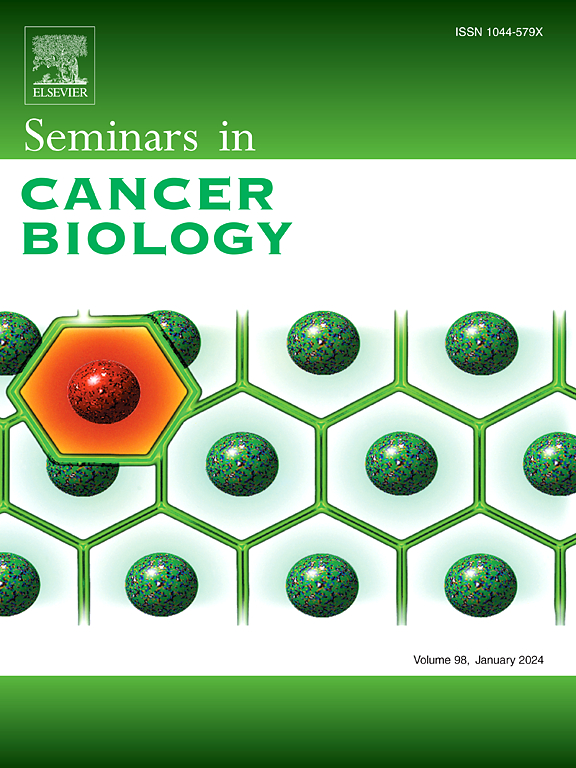Mechanisms and applications of apolipoproteins and apolipoprotein mimetic peptides: Common pathways in cardiovascular disease and cancer
IF 12.1
1区 医学
Q1 ONCOLOGY
引用次数: 0
Abstract
Apolipoproteins are the defining functional component of lipoproteins and play critical roles in lipid transport and metabolism. High-density lipoprotein (HDL) and its primary functional constituent, apolipoprotein A-I, are of particular importance because of anti-inflammatory and antioxidant properties. Apolipoprotein mimetic peptides are short-chain amino acids designed to mimic the functions and alpha-helical structure of endogenous apolipoproteins and have demonstrated efficacy in ameliorating animal models of cardiovascular disease (CVD) and cancer. The mechanisms underlying the mimetics are yet to be fully elucidated, but a comprehensive review of the literature suggests that the peptides attack pathways shared in the pathophysiology of both diseases. This review also discusses the many pre-clinical studies on the mimetic peptides, highlighting possible mechanisms at work in each. Proposed mechanisms of protection against CVD and cancer include binding and removal of pro-inflammatory oxidized lipids, reduction in reactive oxygen species, and modulation of immune cell populations. Additionally, nanoparticles (NP) formulations incorporating apolipoprotein mimetic peptides or recombinant apolipoproteins have exhibited anti-atherogenic and anti-cancer activity. To date, clinical trials to assess the effect of reconstituted HDL NPs on CVD outcomes have not shown significant improvement. The large body of successful animal studies on apolipoproteins and apolipoprotein mimetic peptides presents a disconnect between pre-clinical and clinical efficacy, highlighting the need for a more complete understanding of the underlying pathways and mechanisms.
载脂蛋白和载脂蛋白模拟肽的机制和应用:心血管疾病和癌症的共同途径。
载脂蛋白是脂蛋白的关键功能成分,在脂质转运和代谢中起关键作用。高密度脂蛋白(HDL)及其主要功能成分载脂蛋白A-I因其抗炎和抗氧化特性而尤为重要。载脂蛋白模拟肽是一种短链氨基酸,旨在模仿内源性载脂蛋白的功能和α -螺旋结构,并在改善心血管疾病(CVD)和癌症的动物模型中显示出疗效。模拟物的机制尚未完全阐明,但对文献的全面回顾表明,肽的攻击途径在这两种疾病的病理生理学中是共享的。这篇综述还讨论了许多临床前研究的模拟肽,突出可能的机制,在每个工作。目前提出的预防心血管疾病和癌症的机制包括结合和清除促炎氧化脂质、减少活性氧和调节免疫细胞群。此外,含有载脂蛋白模拟肽或重组载脂蛋白的纳米颗粒(NP)制剂已显示出抗动脉粥样硬化和抗癌活性。迄今为止,评估重组HDL NPs对CVD结局影响的临床试验尚未显示出显著改善。大量关于载脂蛋白和模拟载脂蛋白肽的成功动物研究表明,临床前和临床疗效之间存在脱节,这突出了对潜在途径和机制的更全面理解的必要性。
本文章由计算机程序翻译,如有差异,请以英文原文为准。
求助全文
约1分钟内获得全文
求助全文
来源期刊

Seminars in cancer biology
医学-肿瘤学
CiteScore
26.80
自引率
4.10%
发文量
347
审稿时长
15.1 weeks
期刊介绍:
Seminars in Cancer Biology (YSCBI) is a specialized review journal that focuses on the field of molecular oncology. Its primary objective is to keep scientists up-to-date with the latest developments in this field.
The journal adopts a thematic approach, dedicating each issue to an important topic of interest to cancer biologists. These topics cover a range of research areas, including the underlying genetic and molecular causes of cellular transformation and cancer, as well as the molecular basis of potential therapies.
To ensure the highest quality and expertise, every issue is supervised by a guest editor or editors who are internationally recognized experts in the respective field. Each issue features approximately eight to twelve authoritative invited reviews that cover various aspects of the chosen subject area.
The ultimate goal of each issue of YSCBI is to offer a cohesive, easily comprehensible, and engaging overview of the selected topic. The journal strives to provide scientists with a coordinated and lively examination of the latest developments in the field of molecular oncology.
 求助内容:
求助内容: 应助结果提醒方式:
应助结果提醒方式:


